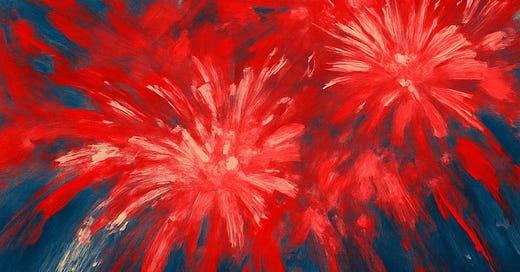i pulled up to the fremont bridge on my scooter, friends trailing behind me like a little procession. parked right in front of this couple who watched me lock up, eyes tracking every move like i’d rolled a hearse onto the sidewalk.
“is the scooter blocking the way? i can move it if it is,” i asked.
they waved me off—“no, no, you’re good!”—relieved, maybe, that someone still asked.
we carved out a spot next to a family doing their best to ignore my group. they were probably rethinking their location once we started cutting up with the homeboy who came by asking for a modelo. on the other side was a couple in matching american flag cowboy hats: plastic, sagging, the party city version of patriotism. i’d already hit the fremont 7-11 for hot wings—cheap, tangy, neon orange. my fingers were sticky, and i gave up trying not to wipe them on my pants after the second wing.
our circle was loud, alive. we laughed about nothing, happy just to be there together. somebody clinked a bottle against a phone case, one of those dumb cheers that meant nothing and everything, and for a second it felt like we were the only ones awake at the wake.
joy and grief, pressed hip-to-hip on the same patch of concrete. around us, the city played dead.
from where i stood on the bridge, the I-5 bridge sliced through the sky, and fireworks started to explode under it—bursts of pink and gold lighting up the low clouds and everybody’s faces, for a second making the night feel alive. people were in hoodies and jackets, shorts and hats—classic seattle layering, no sweat anywhere, just that steady breeze off the water. the bridge railing was packed, bikes and helmets hanging off it, everyone crowding in for a better view. nobody really talking—phones out, arms up, the kind of quiet that’s less reverence and more collective pause.
meanwhile, the country’s hangover sat heavy. a former reality tv host back in office, revenge tour in full swing. headlines announcing new bans, rollbacks, and cuts—healthcare yanked, trans rights erased, the wealthy laughing all the way to the bank while the rest of us split the bill thinner every year. if the old america was a dream, this is the hangover: your wallet gone, and you’re the one left to pay.
but funerals aren’t just silence. there’s always that corner where somebody’s cracking up, reminding you that life keeps moving even while something else ends. that was us—laughing, passing beers, a stubborn spark in the middle of the mourning.
why was everyone else there? maybe habit, maybe hope, maybe just nowhere else to be. some families brought kids who didn’t know the script was broken. a few couples held hands and looked up, like the next firework might actually mean something again. nobody explaining the bursts to their kids, no bedtime stories about freedom or glory. just tired faces letting the spectacle fill the silence.
so what’s the funeral really for? not just the country—what’s dying is the myth of american exceptionalism, the story that democracy here is inevitable, that “anything is possible.” the mask is off. and now we have to decide what’s worth saving, and what should be buried for good.
i’m not nostalgic for the old lies. i don’t want the reboot. i want what’s next—the unruly, the untested. if we’re killing off the old story, let’s inherit something worth the grief. rights for people who never had them. a country that doesn’t flinch at its own reflection.
the fireworks ended. nobody clapped. people shuffled off, cans hitting the grass. i stood there for a minute, then walked across the street with my friend and caught the bus back—modelos gone, wings just a memory, the bridge behind us already emptying out. the city settling back into itself, or maybe just playing possum.
maybe next year, we’ll build something that doesn’t need this kind of eulogy. until then, we’ll keep showing up—not because we believe, but because showing up is its own protest.


